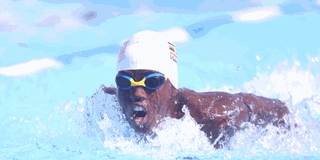Kaganda: Being best is a lot of work

Splash of reward. Kaganda was in scintillating form as he bagged three gold, three silver and four bronze medals at Cana in Tanzania recently. PHOTO BY MAKHTUM MUZIRANSA
What you need to know:
It is 7.30pm on a Tuesday and national swimmer Ben Kaganda, has just returned home in Bugolobi from training for his routine dinner.
Even though it is only a day since Kaganda returned from the Cana Zone III Championships in Dar es Salaam – Tanzania, where Uganda finished fourth (1,494 points) behind the hosts, Kenya and Zambia, there are no alterations to routines.
In Dar, this 14-year-old who wants to be “an Olympic medalist and engineer,” won three gold, three silver and four bronze medals to finish second in the boys’ 13-14 years age group with 139 individual points.
“Swimmers must eat no later than 30 minutes after training,” Kaganda, explains the early supper, as I join the table that also has his younger brothers Joshua, 10, Jaysen, three, and mother Shakira Buhura, a masters’ swimmer.
“Some parents (who have to brave traffic) pack food to the pool,” he adds in his strong but controlled voice.
Brotherly love
Joshua, a swimmer too, teases his older brother into explaining what food is recommended for him.
“It depends on blood groups. Mine is O so my coaches (Muzafaru Muwanguzi and Tonnie Kasujja) advise I eat more meat and foods with low gluten, so I can keep light,” a smiling Kaganda, shares.
The brotherly love is evident and provokes memories of parents, including Buhura, torn between cheering and recording videos of their swimmers in Dar.
“My mother wants me to swim more and do well in school. She ensures I am settled even under pressure,” Kaganda, whose championship started with a disqualification in the 50m breaststroke from referee Rosa Rodriguez, before bouncing back to win medals in all other 10 races, says.
“In the pool, you cannot really hear her (cheering), except during turns but her presence is good for me and makes me try to do well,” he adds.
Kaganda’s obsession with improving makes him one of the most self-reflecting local swimmers. No surprise some think he is overly self-critical.
“I don’t focus on what people and the media say. I rely on my friends, parents and Joshua for motivation. It takes work to be number one; I am getting there step by step, improving my times, my technique,” he says.
Breaking through
Kaganda was part of the Ugandan team that won Cana Zone III in Kampala but got out of his shell by winning the 100m backstroke bronze at the more competitive Zone IV gala in Mauritius in April 2016.
“I was scared because Mauritius was my first big event and I didn’t go with my friends. I reached late so didn’t get a feel of the pool but coach Lindsay (Takunnen), worked on my dives, stroke rate and finishes,” Kaganda recounts.
The said friends are Adnan Kabuye, Tendo Mukalazi, Samora Byansi and Darren Ssamula, who introduced him to swimming as a fun activity in 2012, among others.
“When I saw that I was beating my friends in training, I became more competitive but the turning point was when coaches showed us videos of Michael Phelps and Cameron van der Burgh at the London Olympics in 2012. Since then, the biggest motivation for us has always been to make it to that level.”
This closely-knit and promising group is on course but requires motivation in form of coaching, exposure and scholarships.
For Kaganda, that Mauritius bronze was the biggest leap and is “most treasured” in over 100 medal collections kept in a shelf between living and dining rooms. A few medals have been given to friends as souvenirs.“Every medal is equal because they translate to how well I did in particular races,” Kaganda, now a mainstay in the national and Dolphins Swim Club, set ups adds.
“Swimming for Uganda and Dolphins is an honour. In local competitions, you know whom you are competing against so you focus on club points.
“When we travel to tighter competitions, we learn and rate our times against the rest of the continent.
“In Dar, I knew most swimmers in my age group except the South Africans – one of them (Zinadeen Scheepers) was good at breast and free. The other (Stevens Nazario) had a good backstroke,” Kaganda noted.
Scheepers and Kenya’s Mohammed Khandwalla left Kaganda disappointed after his breaststroke let him down in the 200m individual medley (IM). He thinks not winning this gold cost him top spot in his age group.
“I am good at the other three but breaststroke is key in IM. My coaches say it is mainly my pull that lets me down because I don’t put down my head. But my kick is strong so it helps me keep up,” he reflects.
As he continues to grow, Kaganda will need more than just a better kick to find the greatness he craves.




